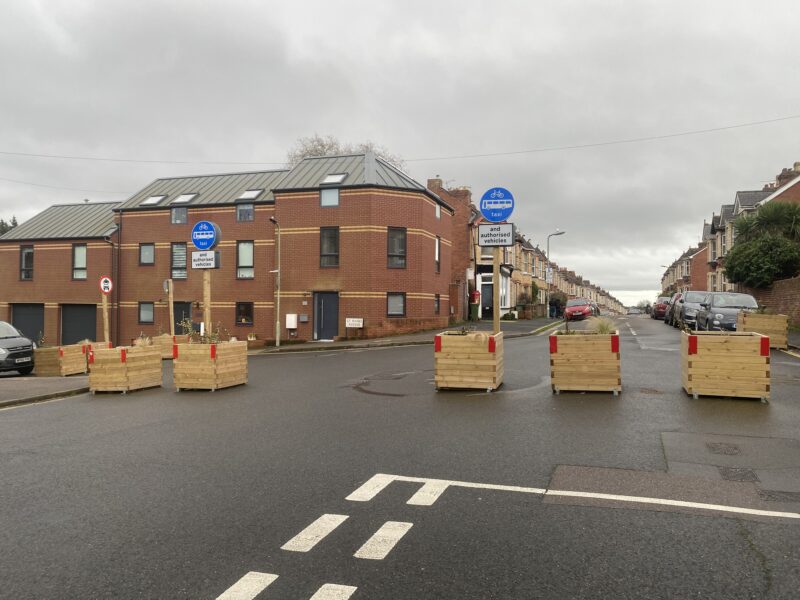
Last July, following the resignation of Boris Johnson, a by-election was triggered in the Outer London constituency of Uxbridge and South Ruislip. Given the manner of Johnson’s resignation and the national swing away from the Conservatives, it was widely assumed to be a shoo-in for the Labour candidate. Somewhat shockingly, the Tories managed to hold on to the seat, albeit by a tiny margin of 495.
The Conservatives won Uxbridge by positioning themselves against the proposed expansion of the ULEZ tax to the constituency, and their unexpected victory brought an important debate to the fore: how to implement green policies without alienating working people by unduly costing and disrupting their day to day lives. Since last August, this debate has also been playing out on the streets of Exeter.
Seven months ago, Devon County Council implemented a Low Traffic Neighbourhood Scheme in the areas of Heavitree and Whipton (in student geography, a short walk from Henry’s Bar). The scheme has cut off vehicle access (with the exception of buses and taxis) to selected roads, with the stated aims of reducing traffic and pollution, and improving road safety.
The LTN has faced major backlash and protest from within the local community. Opponents to the scheme argue that the blockages simply move traffic onto the main roads, increasing congestion – and as a result increasing journey times and pollution. Advocates for the scheme say it makes the streets cleaner and safer, and feel frustrated by those who break the rules.
Defenders of the LTN recently staged a ‘human bollard’ demonstration, standing in the path of private vehicles continuing to drive through the bus gates. In a widely reported incident, a white van was filmed driving through these protestors, leaving one with a minor injury.
I reached out to leading locals from both sides of the debate to try and understand their arguments and frustrations.
Ian Frankum is a frustrated local who has been a vocal opponent to the scheme for months, while Caspar Hughes, a climate campaigner, defends the LTN, and was involved in the recent ‘human bollard’ activism.
Ian told me that for affected residents, of which there are around 17,000, the scheme means “increased journey times, mileage, missed appointments, delayed Emergency Services, slower public transport and increased emissions from slow or idling vehicles”. He also notes how it negatively affects local businesspeople going between appointments, as well as those caring for elderly relatives or visiting friends. He says that the upshot of this is an increase in community-wide “stress, isolation and mental health issues.”
“[The LTN is causing] stress, isolation and mental health issues.”
Ian Frankum
While acknowledging that the council had no legal requirement to consult before implementation, Ian feels they made a “huge mistake” with their limited approach to the public consultation. He told me that the council only issued a small online consultation, and that all four schemes they proposed were actually voted against by the small sample size. He also says that the council claim to have consulted local businesses “that had closed some 8 years previously.” While Caspar defends the scheme, he does acknowledge that “others don’t feel the consultation was good enough for them”, and says that the council may “have to revise their processes.”
The LTN is currently on an initial trial period, and Caspar argues that “there isn’t much point in running a trial if the rules aren’t being enforced.” It was due to this frustration, as well as a concern around child safety issues of continuing traffic through restricted areas, that Caspar and his ‘Safe Streets Now’ team staged the ‘human bollards’ demonstration. He says that he “didn’t consider it a protest. We were just doing the job that the police and council have failed to do.”
“We were just doing the job that the police and council have failed to do.”
Caspar Hughes
In reference to the white van incident, Caspar remarked that he was “shocked and not surprised”, saying that it was actually the second vehicle to drive through his team. With regard to the van incident and other acts of vandalism and criminality, Ian made it absolutely clear that he does “not condone any law breaking.”
Caspar says that most LTN’s “do end up being supported by the local residents…often after a fractious start” and that “if we are to achieve our legal Paris agreement obligations we will need to implement LTNs in every residential neighbourhood and invest heavily in cheap, regular and reliable public transport.”
One thing that’s absolutely clear is that the debate is causing a rift in the community. Ian believes that the LTN has “pitched neighbours against each other”, leading to “polarised and entrenched views on either side.” Caspar says that “there has been a lot of abuse aimed at me and us on social media”, and showed me an example of some threatening messages he has received on Facebook.
Exeter MP Ben Bradshaw has previously spoken in support of Low Traffic Neighbourhoods, however both Tessa Tucker (Conservative candidate for Exeter) as well as Simon Jupp (Conservative MP for East Devon) have called for the scheme to be scrapped. But at the end of the day, it is a council issue, and it remains to be seen what action will be taken after the trial period ends on the 8th of May.


